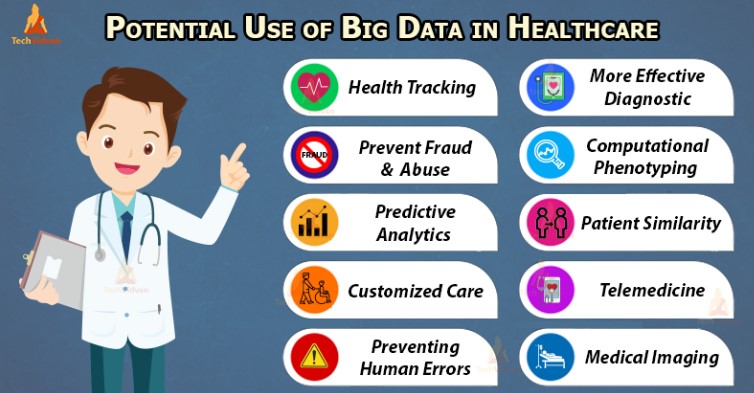The healthcare industry is rapidly evolving, and big data is playing a significant role in this transformation. The massive amounts of data generated by patients, healthcare providers, and researchers can be analyzed to improve patient outcomes, reduce costs, and enhance the overall quality of care. Big data analytics is changing the face of healthcare for good, and this article explores how.
What is Big Data in Healthcare?
Big data in healthcare refers to the massive amounts of data generated by patients, healthcare providers, and researchers. This data can include electronic health records (EHRs), medical imaging, genomic data, wearables, and more. Big data analytics in healthcare involves collecting, storing, and analyzing this data to improve patient outcomes and enhance the overall quality of care.
Applications of Big Data Analytics in Healthcare
Precision Medicine
Big data analytics can help healthcare providers deliver personalized treatment plans to patients. By analyzing patient data, healthcare providers can identify biomarkers and genetic variations that can be used to develop targeted therapies. This approach can improve patient outcomes and reduce the risk of adverse effects.
Predictive Analytics
Big data analytics can also help healthcare providers predict and prevent diseases. By analyzing patient data, healthcare providers can identify patterns and risk factors that can be used to predict the likelihood of certain diseases. This approach can help healthcare providers intervene early and prevent diseases from developing.
Operational Efficiency
Big data analytics can also help healthcare providers improve operational efficiency. By analyzing patient flow and resource utilization data, healthcare providers can optimize their operations and reduce costs.
Clinical Trials
Big data analytics can also help researchers develop more effective clinical trials. By analyzing patient data, researchers can identify patient subgroups that are most likely to benefit from certain treatments. This approach can help researchers design more efficient clinical trials and improve the overall success rate of drug development.
Benefits of Big Data Analytics in Healthcare
Improved Patient Outcomes
Big data analytics can help healthcare providers deliver more personalized and targeted treatment plans, which can improve patient outcomes and reduce the risk of adverse effects.
Cost Reduction
Big data analytics can also help healthcare providers reduce costs by optimizing operations and reducing waste.
Enhanced Research and Development
Big data analytics can help researchers develop more effective treatments and improve the overall success rate of drug development.
Preventive Healthcare
Big data analytics can also help healthcare providers predict and prevent diseases, which can lead to better health outcomes and lower healthcare costs in the long run.
Challenges of Big Data Analytics in Healthcare
While big data analytics has many benefits in healthcare, there are also challenges associated with it. Some of these challenges include:
Data Quality
The quality of the data used for analysis can affect the accuracy of the insights generated. Healthcare providers need to ensure that their data is accurate and reliable.
Privacy and Security
The use of big data analytics raises privacy and security concerns. Healthcare providers need to ensure that they comply with relevant regulations and protect patient data.
Skill Gap
There is a shortage of professionals with the skills needed to work with big data analytics tools. Healthcare providers need to invest in training and development programs to bridge this skill gap.
Conclusion
Big data analytics is changing the face of healthcare for good. By analyzing massive amounts of data, healthcare providers can improve patient outcomes, reduce costs, and enhance the overall quality of care. While there are challenges associated with big data analytics in healthcare, these can be overcome with proper planning and investment. The future of healthcare is bright, and big data analytics is at the forefront of this transformation.
FAQs
- What is big data analytics in healthcare? Big data analytics in healthcare involves collecting, storing, and analyzing massive amounts of data generated by patients, healthcare providers, and researchers to improve patient outcomes and enhance the overall quality of care.
- How can big data analytics improve precision medicine? Big data analytics can improve precision medicine by identifying biomarkers and genetic variations that can be used to develop targeted therapies.
- How can big data analytics improve operational efficiency in healthcare? Big data analytics can improve operational efficiency in healthcare by analyzing patient flow and resource utilization data to optimize operations and reduce costs.
- How can big data analytics help researchers develop more effective clinical trials? Big data analytics can help researchers develop more effective clinical trials by identifying patient subgroups that are most likely to benefit from certain treatments.
- What are the challenges associated with big data analytics in healthcare? The challenges associated with big data analytics in healthcare include data quality, privacy and security concerns, and a skill gap in professionals with the skills needed to work with big data analytics tools.
Read More :
- Big Data Analytics : Revolutionizing Business Operations and Profits
- Hadoop vs Spark : Choosing the Right Tool for Your Big Data Needs
- Big Data Management : The Must-Have Tools for Data Cleaning and Preparation
- The Best Open Source Tools for Big Data Analysis
- Big Data Analytics Made Easy : An Introduction to Popular Tools
